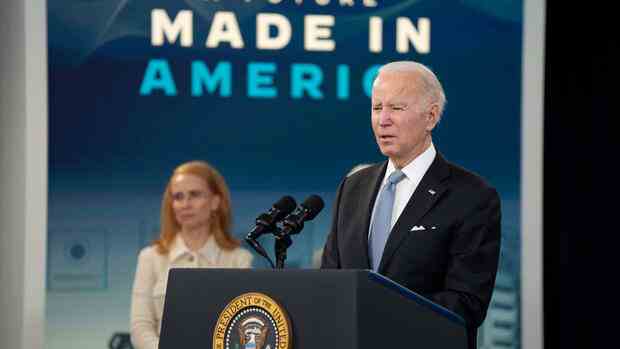The US President wants to promote green technology in the USA – according to the motto America first, the EU fears.
(Photo: imago images/ZUMA Wire)
Brussels The US government is stepping up efforts to defuse disputes with Europeans over subsidies for green technologies. “It is in the US interest to have a strong clean energy industrial base. And it is in the US interest that Europe has a strong industrial base for clean energy,” a top US official said after talks in Brussels.
This is about the Inflation Reduction Act (IRA), a legislative package that was signed by US President Joe Biden last summer and that provides for extensive state aid for high-performance batteries, electric cars and hydrogen systems. The US official stressed that the legislative package gives European companies the opportunity to benefit from the green transition in America.
In the EU, however, there are doubts about the fair play of the Americans. Just a few days ago, Belgian Prime Minister Alexander de Croo accused the US of an “aggressive” campaign to poach companies. To settle this dispute, the US government and the EU Commission have set up a task force.
The first results are already available. The US Treasury Department has clarified guidelines for implementing the IRA. Since then it has been clear that EU companies can also benefit from the incentives to buy electric cars. In concrete terms, the USA made concessions to the EU on one important point: Electric leasing vehicles will also be subsidized in the future with tax credits of up to 7,500 dollars, which will provide relief for German car manufacturers in particular.
Top jobs of the day
Find the best jobs now and
be notified by email.
In Washington, these concessions to the Europeans are controversial. Democratic Senator Joe Manchin, chairman of the Energy Committee and architect of the EV incentives, has sharply criticized the US Treasury Department.
This “bowed to the wishes of companies looking for loopholes,” he said. The law is “carelessly interpreted” and threatens to lose its desired effect: namely that US companies in particular benefit.
More Handelsblatt articles on US subsidies:
The law came into force on January 1, 2023. It contains a number of “Made in America” regulations. Among other things, the USA promotes the purchase of electric cars with up to 7500 dollars per vehicle – but only if the models and components were mainly manufactured in the USA.
In a recent report, Goldman Sachs estimates that the law could mobilize up to $1.5 trillion for green energy projects in the coming decade. Europe risks “clean energy investment migrating to the US unless it develops its own strategy,” the investment bank warned on Wednesday.
EU hopes for further concessions
However, many details about the new regulations are still pending, which is why the EU is hoping for further concessions. The IRA Task Force will meet again next week. The main focus will be on battery production.
The IRA provides the following: To qualify for a portion of the tax credit, 40 percent of a battery’s minerals must first be mined, processed, or recycled in the United States or in a country with which the United States has a free trade agreement.
This level is expected to rise to 80 percent by 2027. Second, to qualify for any other portion of the tax credit, at least 50 percent of a vehicle’s battery components must be manufactured or assembled in North America by 2023—and 100 percent by 2029.
The EU effectively excludes the hurdle of the free trade agreement. But the Treasury Department has already indicated that the US government is aiming for a “broad definition”. That could help European manufacturers qualify for at least some of the subsidies.
The Treasury Department emphasizes that the term “free trade agreement” is not clearly defined in the Inflation Reduction Act or in any other law. You can therefore develop your “own definition” that includes close trading partners.
In Brussels, EU Internal Market Commissioner Thierry Breton is working to counter the IRA with a “Clean Tech Act”. The EU should take on new debts for its industrial policy counteroffensive. But the Frenchman is met with skepticism.
“We have money, that’s not the problem,” says the CDU MEP Christian Ehler. The EU still has 240 billion euros available from the Corona reconstruction fund.
More: This is how the USA wants to conquer the market for hydrogen
